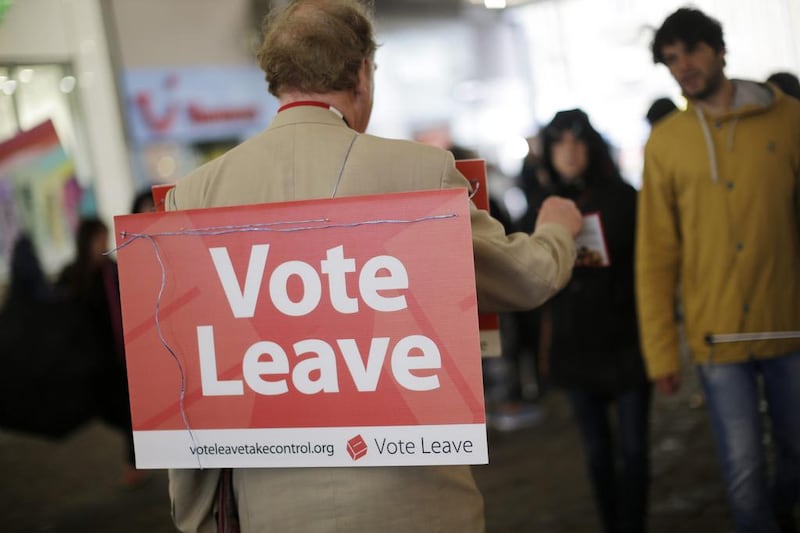Every summer in the UK, I load up our European-made car for the trip to our family place in France. This is usually after it gets a once over by the local car wash business staffed by Polish expatriates. We ensure that we have our European health insurance cards, which give us access to health care on the continent.
Before arriving at the Channel Tunnel, we pass through Kent, the so-called Garden of England, where Eastern European workers are picking fruit. We breeze through the border checkpoint, stock up on goods which are not subject to tariff, and motor southward through thousands of acres of farmland underwritten in part by the common agricultural policy.
Once at our holiday home, we are joined by my British passport-bearing brother-in-law and his family, who have lived in Paris for many years under EU-guaranteed freedom of movement conventions. We might also be joined by his daughter, who despite living in France studies at Bristol University. Both my wife and my youngest son have Belgian passports but are able to live, with access to public services, with me in the UK. My eldest child might also take time off from her job in London, which thrives on business conducted across the EU and which would struggle if barriers to such business were erected.
None of the above is intended to bolster the case for remaining in the EU after the June 23 referendum. There are compelling reasons for preventing further European integration and indeed for reclaiming some legal, economic and social rights.
It is intended rather to illustrate how interwoven life can be for EU member nation citizenry – even for those from Britain, which has, at least on paper, been able to secure social and economic immunities not enjoyed or demanded by other member states.
A leave outcome after June 23 will trigger the beginning of a protracted legal process through which Britain will seek to renegotiate every aspect of its relationship with Europe with outcomes that cannot now be reliably predicted. It would be a messy divorce followed by attempts at a settlement with jilted former EU partners sitting on the other side of the table.
The threat of Brexit has already harmed the national economy, suppressed the markets, driven down the value of the currency and caused delays in government policy decisions.
A leave vote would probably trigger the resignation of the prime minister and open up a divisive contest for the leadership of the ruling Conservative party. Furthermore, many of the issues threatening the UK economy and society – such as the shrinking domestic industrial base, trade imbalances, the lack of economic diversification and the pressures of an ageing population – have little to do with the EU. Immigration, which is gaining the most political traction for the “leave” side, will continue to be a problem even after Brexit.
Globalisation and economic migration from outside the EU, shifting demographics and the need for cheap labour will continue to put pressure on local public services. Someone has to nurse the sick in our hospitals or the elderly in their homes. Someone has to pick fruit in Kent if British people are not prepared to do it. Thousands from outside the EU will still gain entry as students and stay illegally. Thousands will continue to enter as part of extended families. Thousands will have to be accepted as refugees.
Leavers do have powerful arguments on their side. Britain’s unwritten constitution demands that nothing come between the electorate and those they elect and can subsequently eject from office. Parliamentary democracy is underpinned by the rule of law, guaranteed by parliament, and so legal and legislative initiatives introduced by unelected Brussels-based Eurocrats are, leavers argue, blatant assaults on British sovereignty.
In less than 100 years, Britain has made the journey from running the largest empire ever known to its current status as the world’s fifth largest economy.
In this time, and despite its enduring soft power status, it has ceded power and influence to America and has allowed its once powerful industrial base to decline and its military to become seriously depleted. Despite the assurances from the “leave” side that Britain has the natural economic and political heft to find its own way in the world, little has been provided in the way of hard numbers or strategy to back this up.
Historically, Britain has been able to remain geographically and politically aloof from the continent, choosing its battles, protecting its trading and strategic interests with its formidable (but now much reduced) navy, and exercising its international post war entitlements at the United Nations and other multilateral agencies. Not so much now.
In a world increasingly inclined towards the seductive isolationist and paranoid rhetoric of demagogues such as Donald Trump, is this a good time to detach the UK so abruptly from the wider European family? It would be a triumph of ideology (no matter how compelling) over hard pragmatism.
Martin Newland is a former editor in chief of The National





